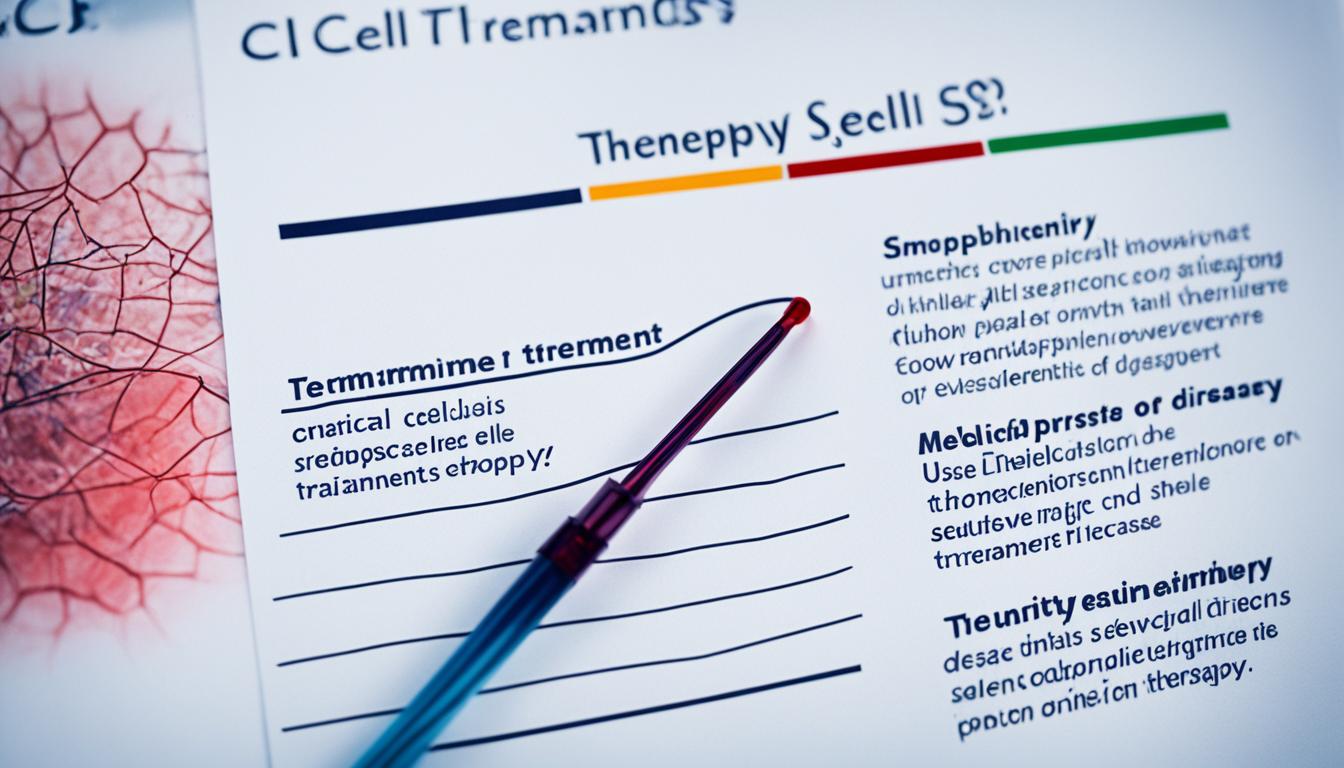Autoimmune diseases happen when the immune system attacks the body’s own tissues. Some common ones are rheumatoid arthritis, lupus, type 1 diabetes, and psoriasis. People with these illnesses might feel tired, have muscle pains, low body temperatures, lose hair, and experience joint and tissue swelling. The main reason for these diseases isn’t clear, but it might be a mix of genes and the environment.
Stem cell therapy is a new way to help with autoimmune diseases. It involves using stem cells to fix organs and help the immune system work better. This treatment isn’t ready yet for diseases that cause swelling, but it looks good based on early studies.
Key Takeaways:
- Autoimmune diseases happen when the body’s immune system attacks its own parts.
- These diseases can make a person feel weak, have muscle pains, low temperatures, lose hair, and have swollen joints.
- The real causes of autoimmune diseases are not really clear, but likely come from both genes and the environment.
- Stem cell therapy seems to be a good option for treating these diseases by fixing organs and balancing the immune system.
- Even though it’s not approved yet for diseases that cause swelling, stem cell therapy is showing good results for other related conditions.
Keep reading to find out more about stem cell therapy for autoimmune diseases, and its possible use for diseases that cause swelling.
Stem Cell Therapy for Autoimmune Diseases
Stem cell therapy is a new and exciting way to treat autoimmune diseases. It uses mesenchymal stem cells (MSCs) to heal damaged tissues. These cells also help calm down an immune system that is too active.
MSCs can change into different types of cells. This includes cells like bone, cartilage, muscle, and fat. They also release factors that can control inflammation and help heal tissues.
Studies show that using MSC therapy for conditions like rheumatoid arthritis and lupus can be helpful. These conditions cause persistent inflammation and damage. By reducing inflammation and aiding in tissue repair, MSCs can improve symptoms.
The power of stem cell therapy for autoimmune diseases is still being understood. More research is necessary. Yet, early results are encouraging, giving hope to those looking for new treatment options.
The Benefits of Stem Cell Therapy for Autoimmune Diseases:
- Regeneration of damaged tissues
- Modulation of the immune response
- Reduction of chronic inflammation
- Promotion of tissue healing
- Potential for long-lasting relief
Although stem cell therapy for autoimmune diseases is just starting, its impact could be huge. As more studies are done, we’ll learn how safe and effective it is. This treatment method could offer patients a better life with their condition. The future of treating autoimmune diseases looks very promising with stem cell therapy.
Stem Cell Therapy for Swelling Disease
Stem cell therapy is not yet OK’ed for swelling disease. But, lots of experts are looking into how it could help. They’re focusing on a type of stem cell called mesenchymal stem cells (MSCs). These cells seem to help control the immune system and lower the body’s swelling response.
Research shows that using MSCs can make life better for people with different autoimmune diseases. By using MSCs, scientists hope to make new treatments for swelling disease. These treatments would fight the main causes of the condition.
Still, we need more research to check if stem cell therapy really helps with swelling disease. Right now, there are tests being done to see how well stem cell therapy works for swelling disease and other autoimmune illnesses.
The results from these tests will be key. They could show if stem cell therapy is a good choice for swelling disease. This information will help doctors and researchers look for new ways to treat or even cure swelling disease.
Promising Results in Other Autoimmune Conditions
Stem cell therapy has shown good results in treating other autoimmune diseases. This gives hope that it could also work for swelling disease. Research highlights that MSC-based therapy is especially good at handling diseases like rheumatoid arthritis and lupus.
MSCs can heal damaged organs, stimulate new tissue growth, and help adjust immune responses. This makes them a strong possibility for creating therapies for swelling disease. They could also help with other autoimmune issues.
Scientists believe stem cell therapy could create new ways to treat swelling disease. This could be a game-changer for patients who face this condition every day.
Potential Benefits and Future Directions
Stem cell therapy for swelling disease offers more than just managing symptoms. It aims to treat the real causes, giving patients a chance at lasting relief and a better life.
With this therapy, treatments could be customized for each patient. This approach could be more effective, possibly lowering the need for typical drugs.
The hope is that further study on stem cell therapy will show it’s safe and works well for swelling disease. If so, it could lead to brand new treatments that really make a difference. This would improve life for those with swelling disease.
Conclusion
Swelling disease is an autoimmune condition. It causes pain and swelling in the body. There are treatments, like medication, to help with the symptoms. But, researchers are looking into new options like stem cell therapy. This new method might be effective against autoimmune diseases, swelling disease included. Mesenchymal stem cells could repair organs and help balance the immune system. This could be a big step in managing swelling disease.
But, knowing if stem cell therapy is safe and works well for swelling disease requires more study. There are clinical trials testing stem cell therapy for both swelling disease and other autoimmunie diseases. These trials will provide important information. They will help create better treatments.
As we learn more about stem cell therapy, there is hope for those with swelling disease. This research is very promising. It could lead to new ways to treat autoimmune disorders in the future.

